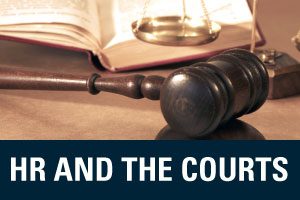HR and the Courts — October 2023
Each month, CUPA-HR General Counsel Ira Shepard provides an overview of several labor and employment law cases and regulatory actions with implications for the higher ed workplace. Here’s the latest from Ira.
Governor Newsom Vetoes Bill That Would Ban Caste Discrimination
California Governor Gavin Newsom vetoed what would have been the first specific state ban on employment discrimination on the basis of caste. Seattle recently became the first U.S. municipality to ban caste discrimination. The California bill would have added caste to the definition of ancestry, which is already included in state law. The governor stated in his veto declaration that existing law already covers this type of discrimination. Commentators weighed in on both sides of this conclusion, some stating there is no specific case law on this question.
Caste is defined as a system of rigid social stratification based on a person’s birth and ancestry and primarily affects people of South Asian descent. Allegations of caste discrimination have recently arisen and gained notoriety in California’s tech industry. This proposal has been subject to much controversy in California, including a hunger strike by those supporting the proposal.
University Trustees May Be Sued for Professor’s Alleged First Amendment Claims
The 5th U.S. Circuit Court of Appeals (covering Louisiana, Mississippi and Texas) recently rejected a university board of trustees’ motion to dismiss First Amendment lawsuit allegations against them, holding that sovereign immunity did not apply to the board members (Jackson v. Wright (5th Cir., No. 22-40059, 9/15/23)).
The case involves eight members of the University of North Texas board of regents who were sued by a music professor. The professor lost his position as editor in chief of a university music journal because of alleged “racial statements” contained in an article he published in advance of a 2020 symposium sponsored by the journal.
In denying the sovereign immunity defense, the court concluded that the trustees had direct authority over university officials who denied the professor his First Amendment rights. The court noted that the trustees had refused to act on a letter the professor had submitted to the trustees raising the issue.
SEIU Local 560 Files NLRB Petition to Represent the Dartmouth College Men’s Basketball Team
To address the student-athlete employee status issue encouraged by the existing National Labor Relations Board’s general counsel, Service Employees International Union Local 560 has brought a petition to the NLRB to represent the Dartmouth College men’s basketball team in collective bargaining negotiation with the institution. This is nearly a decade after the NLRB denied jurisdiction over student athletes in the Northwestern case. If the SEIU is successful, it would be the first case involving potential unionization of college athletes.
The filing follows on the heels of the favorable Supreme Court decision striking down the NCAA’s ban on compensation of student-athletes for name, image and likeness in the 2021 case NCAA v. Alston. While the Supreme Court did not address the labor organizing question under the National Labor Relations Act for student athletes, it certainly took the first step in recognizing the group as employees.
This case brings an added mechanism for the NLRB to decide whether student-athletes are protected under the NLRA and able to organize into labor unions. The NLRB’s general counsel already raised the issue in May of this year in the case brought against the University of Southern California, the Pac-12 Conference, and the NCAA, in which they are alleged to have violated the NLRA in failing to recognize student-athletes as employees.
On the first day of the NLRB hearing, Dartmouth took the position that the athletes involved are students who do not meet any of the common law attributes of employees and, therefore, are not union-eligible employees under the NLRA.
Undergraduate Student-Employee Union Organizing Is Expanding, Leading the Way to More Organization Drives
Bloomberg reports that there are now over a dozen colleges in the U.S. with undergraduate student-employee unions. This is up from just two before 2022. Pay, sick leave and insecurity due to the COVID-19 pandemic have been reported as reasons prompting this significant increase in undergraduate employee organizing, which appears to be motivating expanded organizing at the graduate assistant and professor levels.
A union-organizing campaign appears to be proceeding across campus lines at the California State University System, where a union is organizing as many as 20,000 undergraduate workers at 23 campuses, Bloomberg reports. Separately, 4,000 University of Oregon student employees are set to vote next month on union representation.
Fired Football Coach Sues University, Seeks $130 Million in Damages
A former Northwestern University football coach has sued the university and its president for wrongful discharge and defamation and is seeking a minimum of $130 million in damages. The lawsuit alleges that the coach was fired for “no reason whatsoever.”
The coach was placed on a two-week unpaid suspension after a six-month investigation revealed incidents of hazing within the football program. The report was allegedly inconclusive as to whether the coaches were aware of the hazing. Details of the actual termination will be the subject of the trial. We will follow developments as they unfold.



